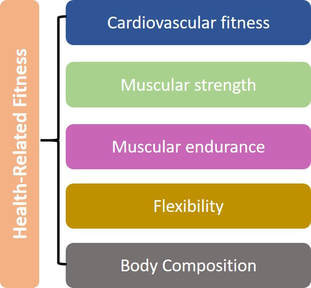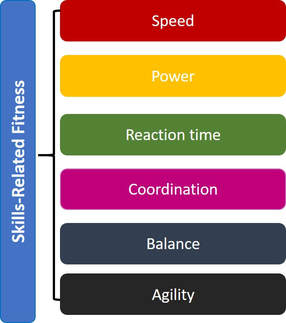We are often used to the term 'physical fitness' to refer to those who workout in the gym frequently; run for miles every day or enjoy lifting heavy weights but these are only a small part of what 'physical fitness' refers to. One accepted definition is:
A state of wellbeing that provides optimal performance*. Robergs and Roberts (1997)
* 'Performance' here is an interesting concept as it doesn't just relate to physical activity performance but the ability to do day-to-day activities with as much ease as possible ie 'performing' tasks such as dressing; walking to the corner shop or daily household chores. NOT necessarily running a marathon (!) so this is as relevant to PwMS as to those without.
Health-related components of fitness
The chart below outlines the main health-related components of fitness that can each be improved through regular 'activity'.
|
Improving muscular fitness (referring to both muscular strength and endurance) can help with balance and coordination. There has been recent evidence published earlier this week (August 2017) that resistance exercise [that is lifting weights] can promote maintenance of brain volume in PwMS. Look out on my blog for a post about this.
|
|
Flexibility refers to the range of movement possible at the joints; developing flexibility is largely the aim of maintaining mobility. It is important for PwMS to maintain as much flexibility as possible to prevent stiffness in the joints which can limit mobility. Daily stretching (with initial support from a physiotherapist) can help to maintain mobility and help with any spasticity challenges. The hips (hip flexor muscles) and the legs can be prone to spasticity: stretching or using a foam roller can help. Please consult a trained professional for advice.
|
|
Body composition refers to the proportion of muscle vs fat that your body carries. We discuss the aspects of healthy weight here.
|
It is helpful to develop these health-related components of fitness from whatever your comfortable starting-point is and whatever your ability; these components can influence key factors related to your experience of MS eg mobility; strength including grip strength, and the ability to sustain movement/activity for longer periods which can help with day to day tasks and improve general well being.
Skills-related components of fitness
Other factors of fitness implicated in the ability to maintain mobility and aid in daily activity are considered skills-related components of fitness or neuromuscular components of fitness, and run alongside the factors discussed above. These components can seem to relate directly to some of our MS symptoms and so can have a direct impact on day to day living with the disease. These skills can be trained and learned with the correct guidance from qualified professionals such as personal trainers or physiotherapists.
The chart below shows the most relevant components of motor fitness which may help with managing MS symptoms:
NB
It can be beneficial to consult with a qualified personal trainer or physiotherapist to explain a little more about these factors and to understand which elements could help you personally and to show you correct form for recommended exercises. Please, please don't do your own research using YouTube or similar - remember fitness bloggers may be well qualified in their field but they don't know you personally nor understand your individual requirements; one-size definitely doesn't fit all when prescribing exercise.
Sources:
Active IQ (2016) Fitness Instructing (gym) handbook
Active IQ (2016) Fitness Instructing (gym) handbook











